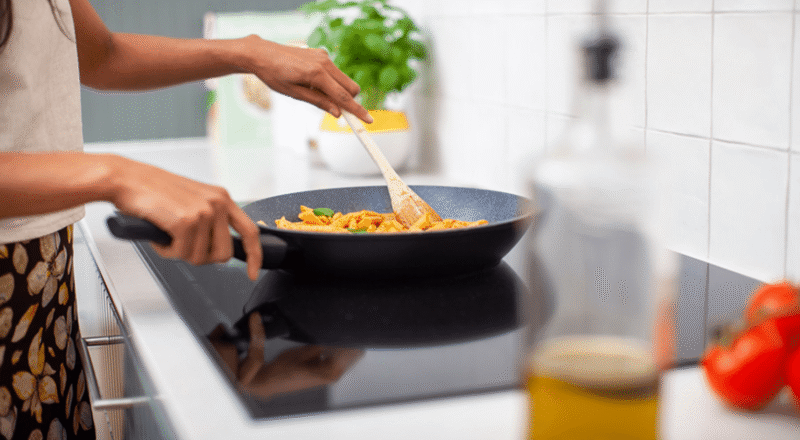Are you curious about the compatibility of cast iron cookware for induction use? If you’re a kitchen professional or a home cook seeking to enhance your culinary experiences, understanding the synergy between cast iron and induction cooktops is essential. Cast iron cookware has long been celebrated for its durability and cooking performance, making it a staple in kitchens worldwide. But does it translate well to induction technology? Let’s dive into the world of cast iron and induction cooking to explore this intriguing combination.

Understanding Induction Cooking
Before delving into the specifics of cast iron cookware for induction use, its important to grasp the basics of induction cooking. Unlike traditional gas or electric stovetops, induction cooking uses electromagnetic fields to directly heat the cookware. This method is both energy-efficient and precise, as it reduces heat loss and allows for quick temperature adjustments.
Benefits of Induction Cooking
Induction cooktops offer numerous advantages, such as faster cooking times, increased safety due to the absence of open flames, and easier cleanup. However, these benefits depend on using compatible cookware, which brings us to the role of cast iron.
Why Choose Cast Iron Cookware?
Cast iron cookware is renowned for its superior heat retention and even distribution. These qualities make it a favorite among chefs for tasks that require consistent temperature control, such as searing meat or slow cooking.
Durability and Longevity
One of the standout features of cast iron is its remarkable durability. With proper care, a cast iron skillet or pot can last for generations, becoming a cherished family heirloom. Learn more about manual cleaning tips to maintain your cookware.
Versatility in the Kitchen
From stovetop to oven, cast iron seamlessly transitions between different heat sources. This versatility is particularly beneficial when using induction cooktops, as it allows for a wide range of cooking techniques.
Compatibility of Cast Iron with Induction
The good news for cast iron enthusiasts is that it is inherently compatible with induction cooktops. The ferrous nature of cast iron ensures that it can be effectively heated through electromagnetic induction.
Ensuring Perfect Contact
For optimal performance, its crucial that the bottom of the cast iron cookware is flat and smooth. This ensures maximum contact with the induction cooktop, facilitating efficient heat transfer. Check out the compatible stovetops for more details.
Potential Challenges
While cast iron is generally a great match for induction, there are a few challenges to be aware of. The heavy weight of cast iron cookware can make it cumbersome to handle, especially when hot. Additionally, its rough surface can sometimes scratch the glass surface of induction cooktops.
Prevention Tips
To prevent scratches, ensure that the bottom of the cookware is clean and free from debris before placing it on the cooktop. You might also consider using a protective mat specifically designed for induction cooking.
How to Season Cast Iron for Induction Cooking
Seasoning is key to maintaining the non-stick properties of cast iron cookware. A well-seasoned pan not only enhances cooking performance but also protects the surface from rust.
Step-by-Step Guide to Seasoning
1. Clean the cookware thoroughly.
2. Apply a thin layer of vegetable oil.
3. Place it upside down in an oven at 375F (190C) for an hour.
4. Allow it to cool in the oven before removing.
Best Practices for Using Cast Iron on Induction
When using cast iron cookware for induction use, its important to follow best practices to ensure longevity and optimal cooking results.
Gradual Heating and Cooling
Unlike other materials, cast iron benefits from gradual heating and cooling. This practice helps prevent thermal shock and extends the life of your cookware.
Regular Maintenance
Keep your cast iron in top condition by regularly seasoning it and avoiding the use of harsh detergents. For specific cleaning tips, refer to manual cleaning tips.
Choosing the Right Cast Iron Cookware
When selecting cast iron cookware for induction use, consider the size, weight, and design that best suit your cooking needs. Some modern cast iron pieces come with enamel coatings, offering the benefits of cast iron with an added layer of protection.
Recommended Brands
Leading brands like Le Creuset, Staub, and Lodge offer high-quality cast iron cookware specifically designed for induction use. For more insights, visit Le Creuset’s guide on induction cookware.
Conclusion
Cast iron cookware for induction use is a match made in culinary heaven. With its outstanding heat retention and compatibility with induction technology, cast iron remains a versatile and efficient choice for modern kitchens. By following the tips outlined in this guide, you can enjoy the benefits of cast iron while embracing the precision of induction cooking.

FAQs
Is cast iron safe for induction cooktops?
Yes, cast iron is safe and compatible with induction cooktops. Its ferrous nature makes it a perfect choice.
Can I use enameled cast iron on induction?
Absolutely. Enameled cast iron works well on induction, offering the benefits of cast iron with an easy-to-clean surface.
How do I prevent my cast iron from scratching the cooktop?
Ensure the bottom is clean and consider using a protective mat. Gradual heating and cooling can also help maintain the cookware’s surface.
This article contains affiliate links. We may earn a commission at no extra cost to you.

